Kia ora. Long stories short, here’s my top six things to note in Aotearoa’s political economy around housing, climate and poverty on Friday, September 27:
Treasury’s Chief Economics Adviser Dominick Stephens gave the year’s most important speech yesterday, saying real and per-capita cuts in public spending implied by the Government’s surplus ambitions for 2028 would have to be unprecedented without tax increases, implying a fiscal savagery worse than that unleashed by Ruth Richardson in her ‘Mother of All Budgets’ of 1991.
In the scoop of the day, Marc Daalder reports for Newsroom the Government could use creative accounting to claim it has sequestered millions of tonnes of additional carbon dioxide.
In the deep-dive of the day, Jem Traylen reports via BusinessDesk-$$$ on how the new Government ignored advice from Treasury and MBIE about the need for a proper medium-to-long term review of immigration policy.
In solutions news, Hastings District Council has appointed unelected youth councillors to its committes with voting rights, even though they’re currently too young to vote in next year’s council elections, Stuff’s Marty Sharpe reports.
In quote of the day, Dunedin Mayor Jules Radich is shocked the Government is downgrading its plans for the new Dunedin Hospital. Stuff
In chart of the day, NZ’s workforce participation rate of over 65s has surged to among the highest rates in the world in the last 20 years.
(There is more detail, analysis and links to documents below the paywall fold and in the podcast above for paying subscribers. If we get over 100 likes we’ll open it up for public reading, listening and sharing.)
1. Treasury warns of spending cuts worse than in 1991
It was billed as a speech about the Crown’s medium-to-long-term fiscal challenges because of an ageing population, which it did admirably, but it was the outlook for the next three years that was the most startling.
Treasury’s Chief Economics Adviser Dominick Stephens gave what I consider the year’s most important speech yesterday, saying real and per-capita cuts in public spending and services implied by the Government’s surplus ambitions for 2028 would have to be unprecedented without tax increases, implying a fiscal savagery worse than that unleashed by Ruth Richardson in her ‘Mother of All Budgets’ of 1991.
Here’s the chart, which is simple to read, but the implications are brutal.
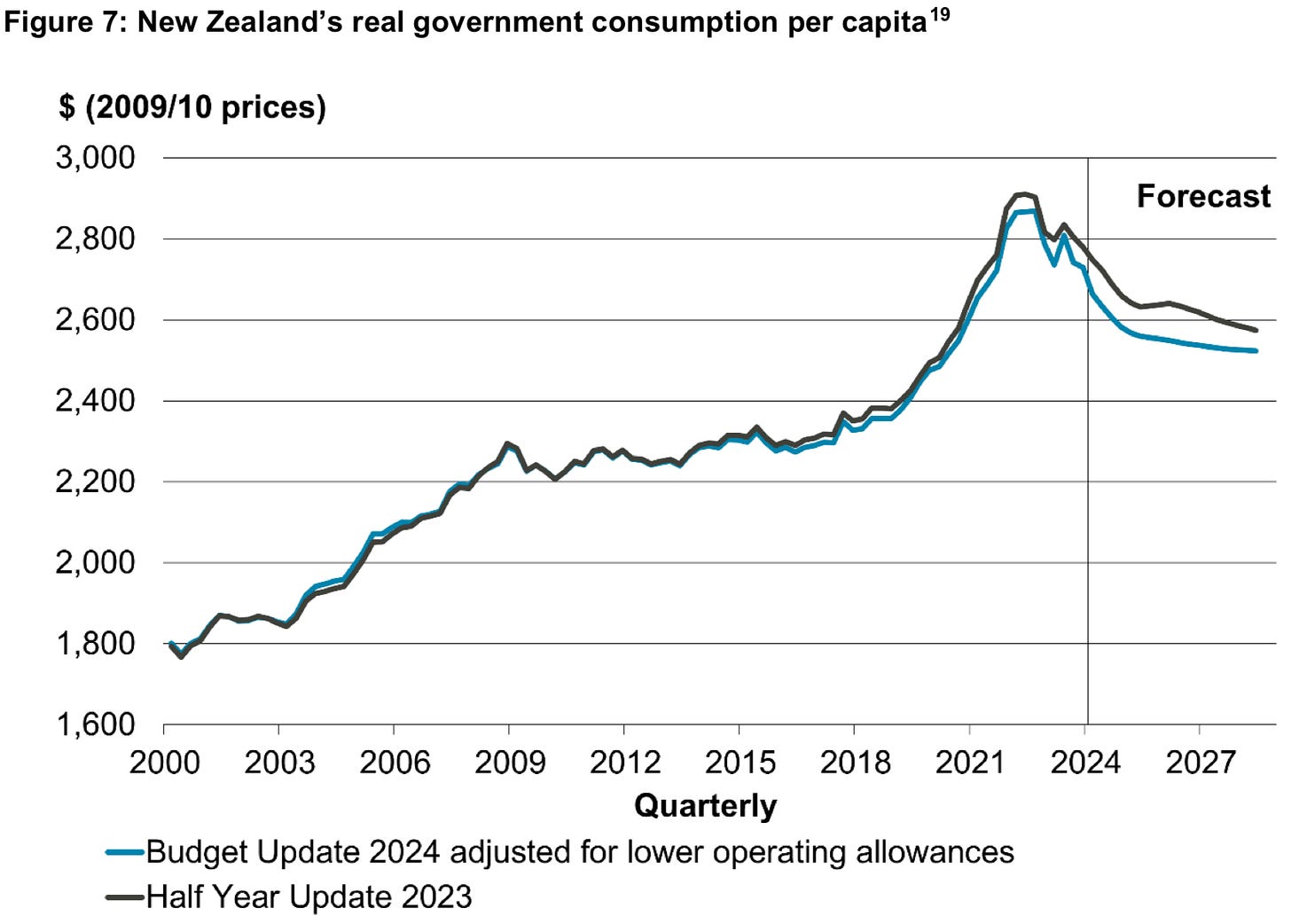
‘Unprecedented cuts in real, per-capita Government spending coming’
Stephens spoke plainly of how much will need to be cut by 2028 (bolding mine):
“In Budget 2024, the Treasury forecast that the operating balance – both actual and structural – would return to surplus in 2027/28. To achieve this consolidation, the Government has announced operating allowances for new spending of $2.4 billion per annum for Budget 2025 through to Budget 2027.
“Pre-commitments and other non-discretionary spending will use up some of those allowances. The Treasury’s high-level estimates suggest that the cost of delivering current services will rise by around $2.5 billion over the year ahead, and we must bear in mind that the population will grow.
“This means that the Government will have to increase revenue or reduce the amount that it spends per person, in inflation adjusted terms, to meet this target. This implies that savings and reprioritisation will likely be a feature of future Budgets, as in Budget 2024.
“The Treasury’s latest forecasts assume that most of the return to surplus will be driven by declines in per capita government consumption (see Figure 7 (above)). The implied speed and size of this decline is generally unprecedented in recent history in New Zealand.” Treasury Chief Economic Adviser Dominick Stephens in his speech titled: “Longevity and the public purse: Fiscal and economic impacts of increasing longevity.”
In my view
The wider speech itself is an excellent explainer on both the fiscal challenges of ageing, but how migration, our rising workforce participation rate because of a relatively high universal NZ Superannuation, along with low interest rates, have softened the burden, relative to previous Treasury forecasts.
The obvious conclusion, which Stephens did not reach, is that either the current entitlements of publicy funded healthcare, education, welfare and universal NZ Super at 66% of the average wage from 65 will have to change, or taxes will have to rise. The obvious hole in our tax system is the taxation of wealth and income from capital gains, especially on the wealth tied up in residential land values.
2. Scoop of the day: ‘Let’s just move the goalposts’
Govt asks if a different assumption about existing trees might help
In a sign the Coalition wants to assume away Aotearoa’s need to reduce emissions or buy emission credits internationally to meet our international and local obligations, Newsroom‘s Marc Daalder reports the Government could use creative accounting to say it has sequestered millions of tonnes of Co2 above expectations through better management of existing forests, rather than cutting emissions or planting new trees.
Forestry Minister Todd McClay sought advice from officials earlier this year about how management of pre-1990 forestry – which includes 1.4 million hectares of planted trees and 7.8 million hectares of natural forest – could contribute to meeting New Zealand’s climate obligations under the Paris Agreement.
Though officials reported back that tens of millions of tonnes could be sequestered, perhaps without having to do much at all, experts warn this could lead to a repeat of the “hot air” carbon credits debacle of the 2010s.
I’m curious
When is the big end of town going to call bullshit on all of this?
3. Deep Dive of the day: ‘Hey. We need a migration strategy.’
Yet Stanford tells Treasury & MBIE: ‘Strategy not possible in ‘real world’.
Jem Traylen reports via BusinessDesk-$$$ on how the new Government and Immigration Minister Erica Stanford in particular ignored advice from Treasury and MBIE about the need for a proper medium-to-long term review of immigration policy.
Treasury said the Government’s policy programme was too focused on short-term, quick fixes & needed to consider how immigration could best support the country’s labour market, and economic and fiscal needs, over the medium to long term.
A recently published Cabinet paper disclosed the internal debate to an unusual level of detail, with Immigration Minister Erica Stanford saying such “theoretical” policy exercises consumed significant time and energy and often failed to reflect “real-world realities”.
In her Cabinet paper, Stanford said there was “no ‘ideal’ number of migrants” and “no ‘target’ for net migration”, but there was a “right balance” that supported growth without putting significant pressure on physical and social infrastructure.
She said the Government would reduce the pressure with its work across housing, healthcare, education, transport, and cutting red tape, while changes to immigration settings would also help in the short to medium term.
‘Let’s have a proper strategy before we reset the settings’
Treasury supported this direction but said a medium- to longer-term picture was needed to guide policy decisions. This would balance the longer-term benefits of immigration policy, such as human capital and labour market benefits, with short-term pressures and challenges.
Treasury said the Government also needed to keep track of the cumulative impact of individual policy changes, including how they affected public services. It said it would be better if officials spent six months upfront sorting out this bigger picture before embarking on another review of work visas.
MBIE said there was a set of “known issues” the minister was focused on responding to, which weren’t likely to change if it did the big-picture work Treasury recommended.
Stanford then was clear that wouldn’t happen.
Stanford said there were several coalition and government priority commitments that had to be fulfilled in the next two years. In an ideal world, she said, these would sit alongside an accurate medium- to longer-term view of how immigration could support New Zealand’s labour market and its economic and fiscal needs.
“However, we know that in reality the development of these types of theoretical outputs by Government consume a significant amount of time and resource and often fail to reflect real-world realities.
“This is particularly true when it comes to forecasting human behaviour, which is always context-dependent and can be unpredictable.” Stanford in the paper.
In my view:
Stanford is essentially saying we should ignore the future because it’s too hard to know what people will do and migration trends are like the weather. They just happen and there’s nothing much any Government can do.
Perhaps she should tell Cabinet colleagues Nicola Willis, Christopher Bishop and Simeon Brown, who are making a lot of long-term decisions that will have to respond or pre-empt what happens with our population.
This refusal to even try to engage with a rational immigration and ‘absorptive capacity’ policy debate just beggars belief.
4. Solutions news: ‘Let’s the give the young the power’
Hastings decides in tight vote to give committee voting powers to youth
This is one way to rectify the democratic deficit endemic right across our governance institutions, both centrally and locally.
Hastings District Council has (ony just) decided to appoint unelected youth councillors to its committes with voting rights, even though they are currently too young to vote in next year’s council elections, Stuff’s Marty Sharpe reports.
5. Quote of the day: Here comes trouble for the Govt
Dunedin Mayor and ODT go ballistic over plan to scale back hospital
“Shocked and outraged, it is quite astonishing ... to be honest I was expecting them to come down here with good news because we are having a march on Saturday and instead we’ve got exactly the opposite.” Dunedin Mayor Jules Radich via Stuff.
Here’s more to suggest the Government is about to lose a lot of support in the South Island. It’s the first five pages of this morning’s Otago Daily Times, along with links to articles the ODT decided not to paywall.
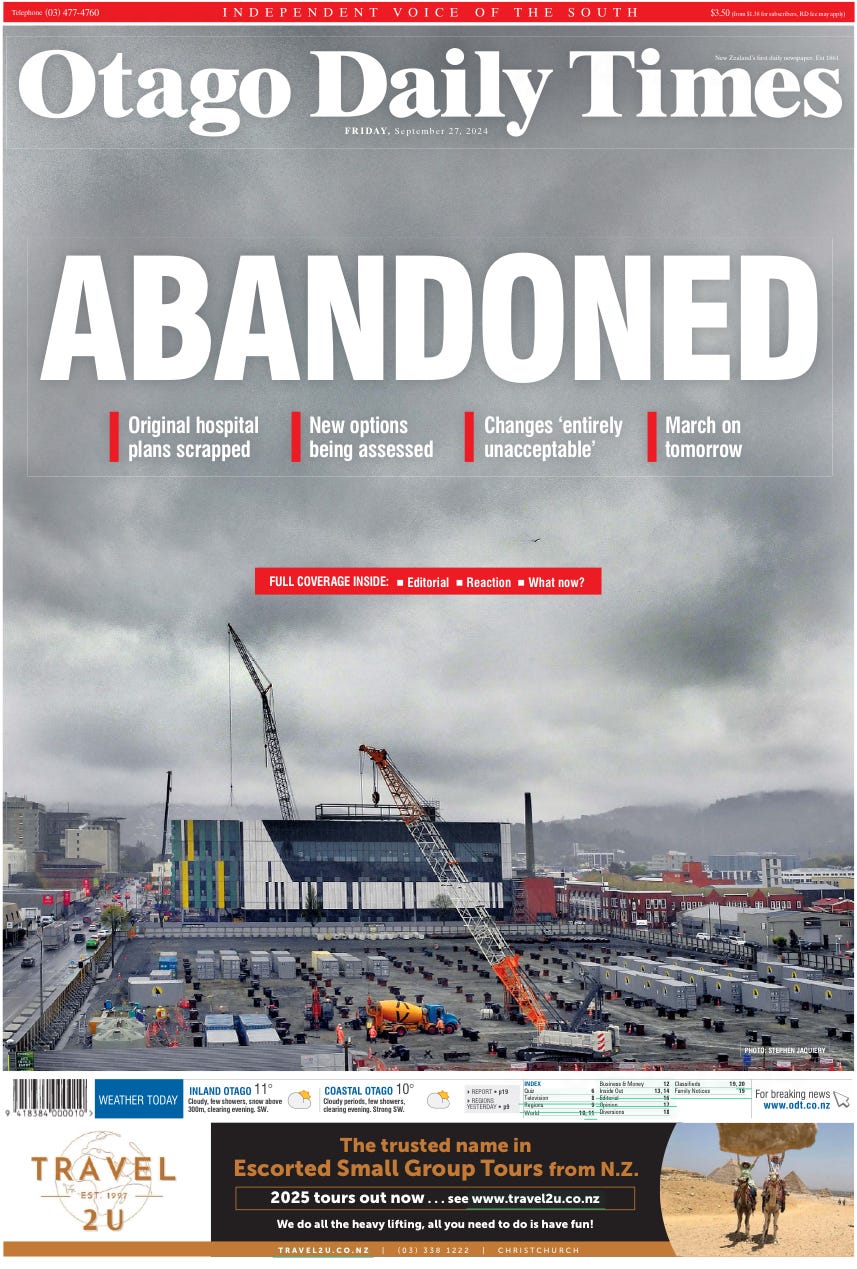
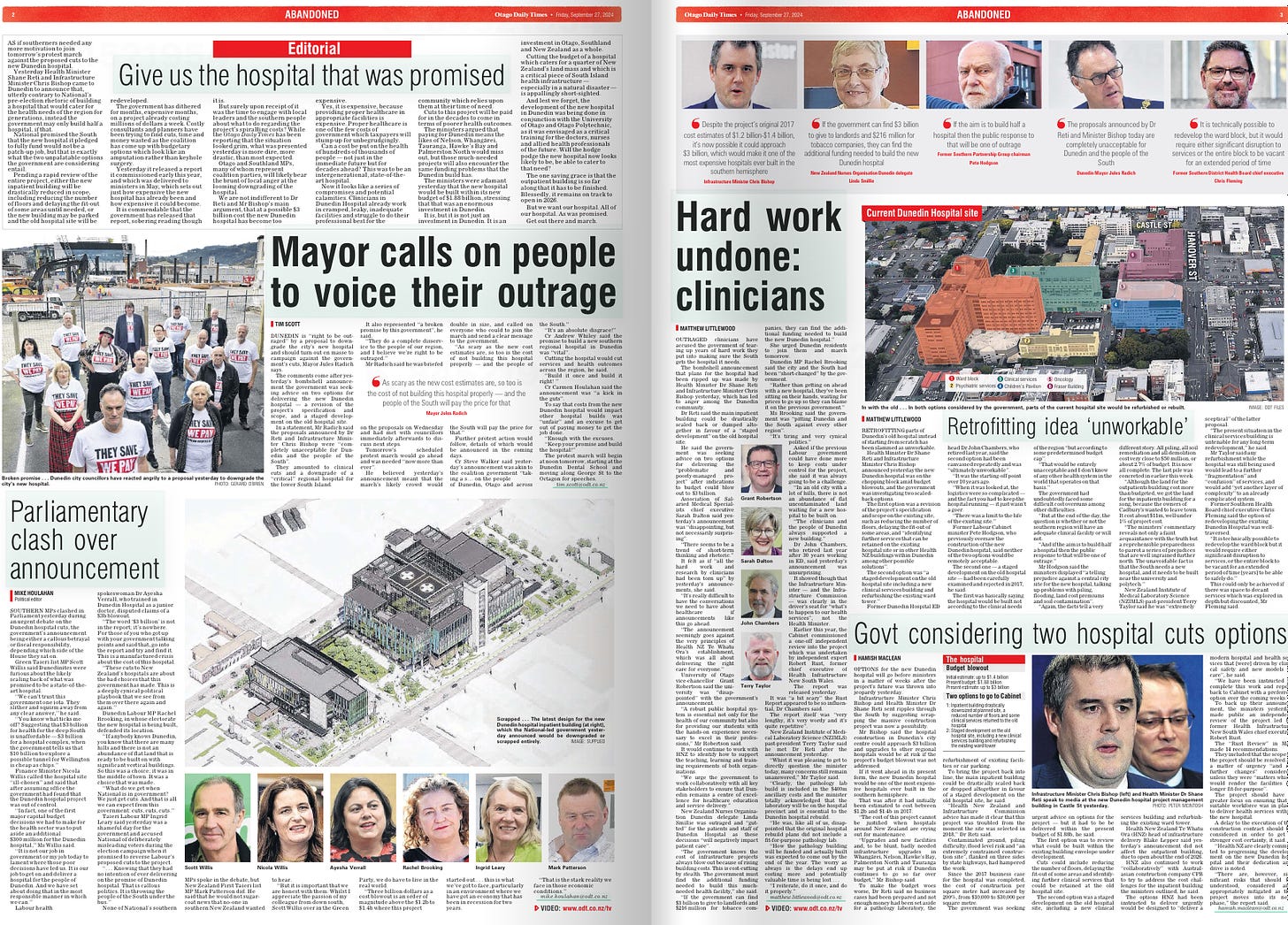

6. Chart of the day: Our pensioners increasingly work too
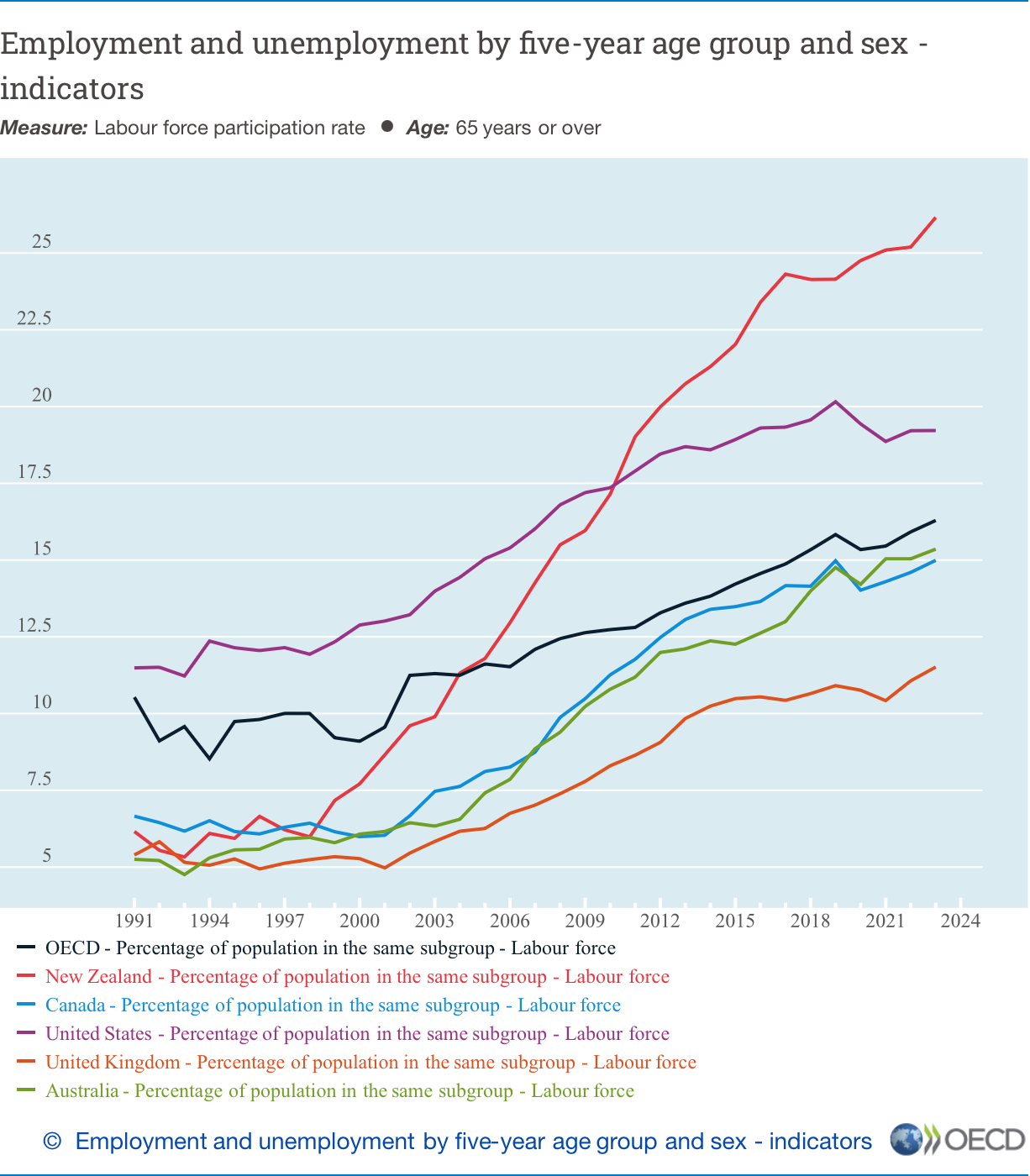
The Kākā’s Journal of Record for Friday, September 27
Health: Infrastructure Minister Chris Bishop and Health Minister Shane Reti announced the new Dunedin hospital could cost $3 billion to build so the Government would either scale it back or develop the old hospital site instead.
Health: New research found the rate of new prescriptions for puberty blockers for youth with gender dysphoria rose in NZ after 2014, but has decreased by roughly 20% since 2021.
Health: Associate Professor Siouxsie Wiles called the Government's move to stop distributing free COVID-19 RATs tests "depressing,” saying a recent study found cognitive deficits associated with even mild COVID-19 infection persisted for at least a year.
Science & climate: Science, Innovation & Technology Minister Judith Collins said the Government agreed in-principle to NIWA acquiring MetService. RNZ
Environment: Stats NZ reported air pollutant concentrations dropped at many air quality monitoring sites over the past eight years.
Economy: Trade Minister Todd McClay announced a new trade deal between NZ and the United Arab Emirates to remove duties on 99% of NZ’s exports to the UAE within three years. RNZ
Cartoon of the day
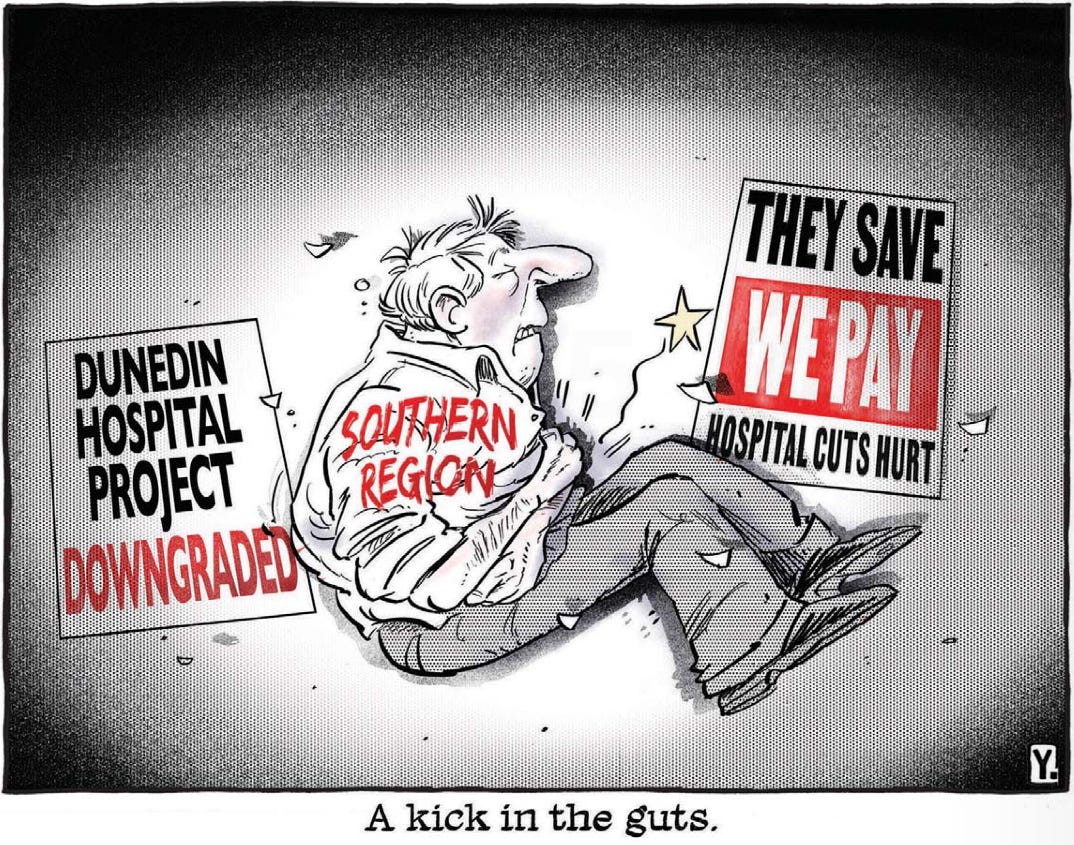
Timeline cleansing nature pic of the day
‘Whew. The coast is clear for a feed. What? There’s someone behind me?’
Ka kite ano
Bernard






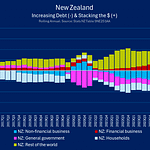

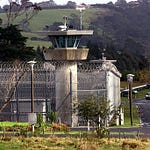







Treasury warns of unprecedented cuts in real spending per capita to achieve surplus